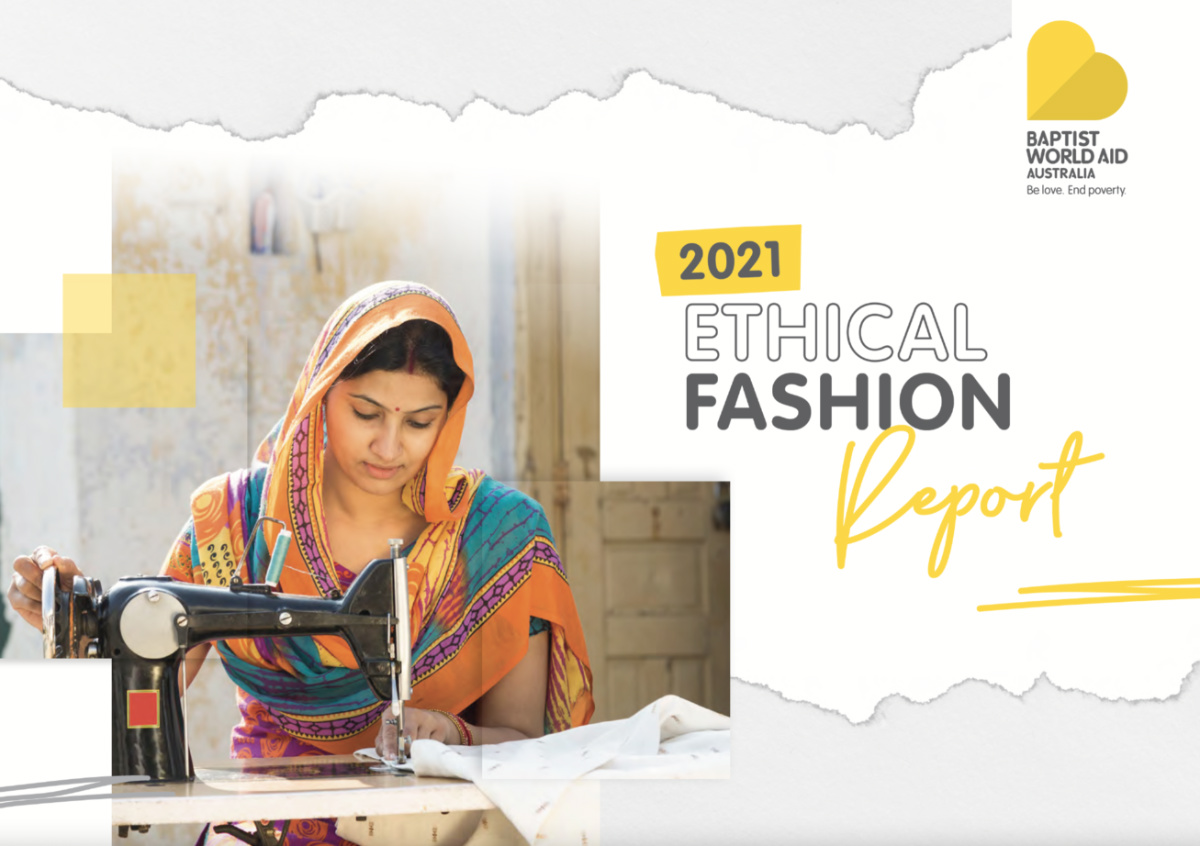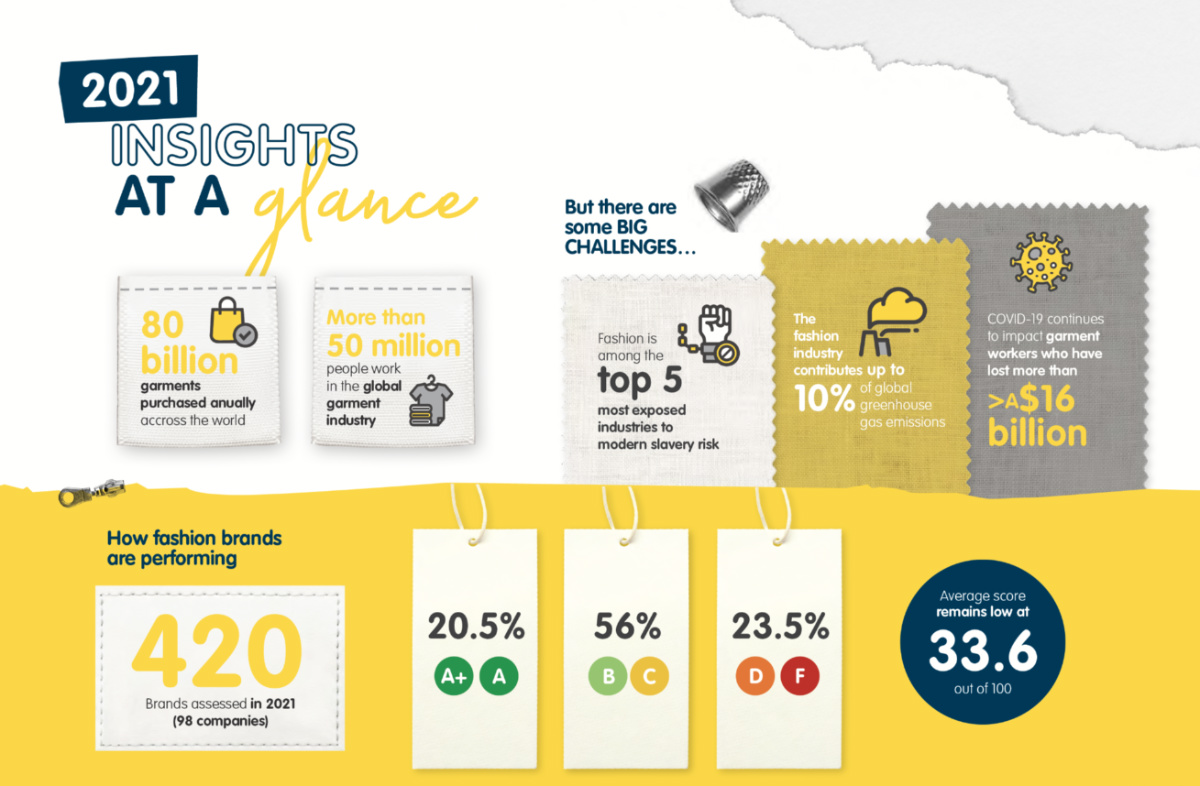Last updated 5pm (AEDT)
Sydney, Australia
Fashion companies are making “slow progress” prioritising the elimination of modern slavery and improving outcomes for climate change, Baptist World Aid Australia’s 2021 Ethical Fashion Report and Guide has found.
Almost 100 companies with a turnover of $A50 million (as well as some smaller companies), representing 420 fashion brands, were surveyed over the past 12 months and given a grade from A+ to F, based on their responses and publicly available information.

Cover of the 2021 Baptist World Aid Australia Ethical Fashion Report 2021.
While companies showed a 40 per cent improvement in their overall grade since the last survey, including investing more than ever in ethical sourcing, BWAA says a vast number of garment workers across the globe are yet to receive a living wage.
“More than 50 million people [worldwide] are employed in clothing production – many are among the most vulnerable to the impacts of COVID-19. Up to 10 per cent of global greenhouse gas emissions occur throughout the fashion supply chain and other environmental impacts from production are significant,” the report, released this week, says.
The development organisation found there are “lingering gaps” in wages and sustainability after 98 companies were comprehensively surveyed across 18 different facets of their supply chains, broadly covering: policies and governance, tracing and risk, supplier relationships and human rights monitoring, worker empowerment, and environmental sustainability.
Only four companies received A+ grades – Etiko, Joyya, Mighty Good Basics and Outland Denim. Among brands with outlets in Australia that scored an ‘A’ ranking were Witchery, Kathmandu, Glassons and H&M, while at the bottom of the rung with ‘F’ ratings were JeansWest, Valleygirl, Sheike and Roxy. Overall, 20.5 per cent of companies scored an A+ or A ranking, 56 per cent scored a B or C ranking and 23.5 per cent scored between D and F.
BWAA’S Ethical Fashion Coordinator Bonnie Graham told Sight there were some alarming and encouraging findings from the report.
“In general this year, 40 per cent of companies have improved their score from 2019, and overall we found the industry taking small steps forward, but there is still a long way to go before ethical and sustainable is synonymous with fashion,” Graham said.
She added that they had seen continual improvement in the industry on foundational company level measures, such as codes of conduct, policies and tracing of supply chains. But when it came to tangible outcomes for garment workers that equated to “change on the ground”, those indicators remained at low levels.
“We are talking about things like payment of living wages, remediation of issues and active support for collective bargaining [that] still have a long way to go,” she said.
On the subject of living wages, which she described as “one of the most pressing issues facing the industry”, only 15 per cent of companies could demonstrate paying a living wage in any of their final stage factories.
“When it comes to paying a living wage at all of their final stage factories, that drops to just four per cent of companies,” she said.
“We absolutely recognise that the fashion system perpetuates a lot of injustices that are quite systemically embedded in the countries where they are producing clothing, but one of the driving reasons behind this report is to push for [that] change,” she said.
“The majority of [the 50 million] workers are women in low-to-middle income countries that don’t have the same levels of social protection or wage minimums that we enjoy in Australia, so the fashion industry, as a multi-million dollar industry, has huge potential to act as a catalyst for change and development through their purchasing relationships in these countries.”

GRAPHIC: Courtesy of Baptist World Aid Australia.
These countries include Bangladesh, where one worker – Sarika – said “If they ask us to work 24 hours then I will have to work 24 hours.”
On the subject of emissions, the report found that the fashion industry currently contributes 10 per cent of global emissions, which equates to around 2.1 billion tonnes a year in 2018.
“Approximately 70 per cent of the fashion industry’s emissions stem from supply chain activities which include manufacturing and raw materials production. The remaining 30 per cent is related to retail, consumer use, and end-of-life phases,” the report said.
“If the fashion industry fails to take significant emission reduction measures, the greenhouse gas (GHG) emissions attributed to the fashion industry are predicted to rise from 2.1 billion tonnes a year in 2018 to 2.7 billion tonnes a year by 2030.”
The report said Australian and New Zealand based companies lag behind their international counterparts on climate commitments.
“Of the 37 companies that lack any evidence of a commitment or strategy, 35 are Australian or New Zealand based. In comparison, of the 25 companies that did evidence a comprehensive commitment and strategy, only four are from Australia or New Zealand.”
BWAA made several recommendations for businesses in the report, including continuing to improve ethical sourcing, increasing transparency of supply chains and ensuring workers receive living wages and have access to unions.
Individuals also were urged to take small steps that will impact garment workers, including switching their buying habits to top rated companies, buying second-hand clothes, and emailing their favourite brands to encourage them to improve their ethical sourcing and sustainability practices.





